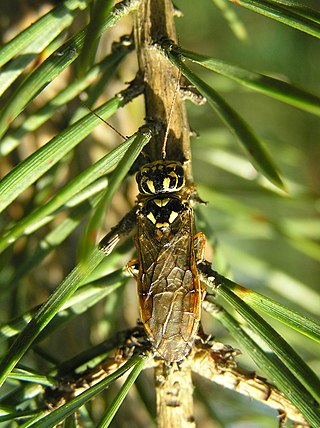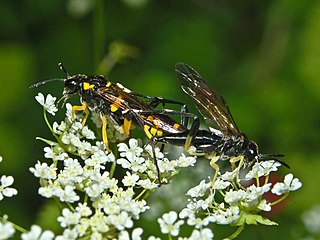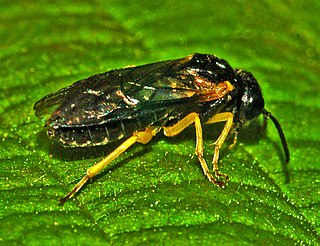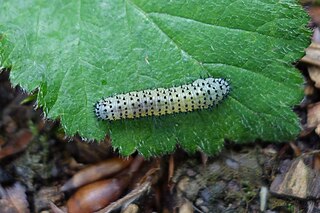
Sawflies are wasp-like insects that are in the suborder Symphyta within the order Hymenoptera, alongside ants, bees, and wasps. The common name comes from the saw-like appearance of the ovipositor, which the females use to cut into the plants where they lay their eggs. The name is associated especially with the Tenthredinoidea, by far the largest superfamily in the suborder, with about 7,000 known species; in the entire suborder, there are 8,000 described species in more than 800 genera. Symphyta is paraphyletic, consisting of several basal groups within the order Hymenoptera, each one rooted inside the previous group, ending with the Apocrita which are not sawflies.

The Orussidae or the parasitic wood wasps represent a small family of sawflies ("Symphyta"). Currently, about 93 extant and four fossil species are known. They take a key position in phylogenetic analyses of Hymenoptera, because they form the sister taxon of the megadiverse apocritan wasps, and the common ancestor of Orussidae + Apocrita evolved parasitism for the first time in course of the evolution of the Hymenoptera. They are also the only sawflies with carnivorous larvae.

The Xyelidae are a comparatively species-poor family of sawflies, comprising about 80 extant species in five genera worldwide, and is the only family in the superfamily Xyeloidea. The fossil record of the family is extensive, comprising more than 120 species and including the oldest fossil Hymenoptera species dating back to the Triassic, between 245 and 208 million years ago. Xyelidae are to be regarded as living fossils since they represent one of the oldest lineages of insects and include still extant forms.

The Megalodontesidae are a small family of sawflies, containing a single living genus, Megalodontes, with some 40 species restricted to the temperate regions of Eurasia. Larvae of Megalodontesidae feed on herbaceous plants. They are distinguished from the closely related Pamphiliidae by their serrate or pectinate antennae.

Pamphiliidae is a small family within Symphyta, containing some 200 species from the temperate regions of North America and Eurasia. The larvae feed on plants, using silk to build webs or tents, or to roll leaves into tubes in which they feed, thus earning them the common names leaf-rolling sawflies or web-spinning sawflies. Some species are gregarious and the larvae live in large groups. Fossils of Pamphiliidae have been dated to the Jurassic period.

Tenthredinidae is the largest family of sawflies, with well over 7,500 species worldwide, divided into 430 genera. Larvae are herbivores and typically feed on the foliage of trees and shrubs, with occasional exceptions that are leaf miners, stem borers, or gall makers. The larvae of externally feeding species resemble small caterpillars. As with all hymenopterans, common sawflies undergo complete metamorphosis.

Nematinae is a subfamily of sawflies belonging to the family Tenthredinidae. It contains over 1250 described species in ~40 genera. Members of this subfamily feed on a wide range of plants and employ a wide range of feeding habits, both internally and externally, on their host plants.

Megalodontes is a genus of sawflies within the Symphyta belonging to the family Megalodontesidae subfamily Megalodontesinae.

Tenthredo is a genus of sawflies with more than 700 species of the family Tenthredinidae, subfamily Tenthredininae. It is of Holarctic distribution.

Macrophya is a genus of sawfly.

Cephidae is a family of stem sawflies in the order Hymenoptera. There are about 27 genera and more than 160 described species in Cephidae.

Monostegia is a genus of sawfly. The authority is based on the description by Achille Costa and Oronzio Costa, although earlier work grants this to Fabricius 1798., though the most common species, M. abdominalis, bears the authority of Fabricius.

Tenthredinini are a tribe of sawflies (Hymenoptera), including the family genus Tenthredo.

Aneugmenus is a genus of sawfly.

Monsoma is a genus of common sawflies in the family Tenthredinidae. There are at least two described species in Monsoma.

Periclista is a genus of common sawflies in the family Tenthredinidae. There are at least 20 described species in Periclista.
Aprosthema is a genus of insects belonging to the family Argidae.
Pseudodineura is a genus of sawflies belonging to the family Tenthredinidae.
Neurotoma is a genus of insects belonging to the family Pamphiliidae.

Mary Foley Benson was an American scientific illustrator and fine artist. She specialized in detailed, realistic watercolor paintings of plants and insects.














